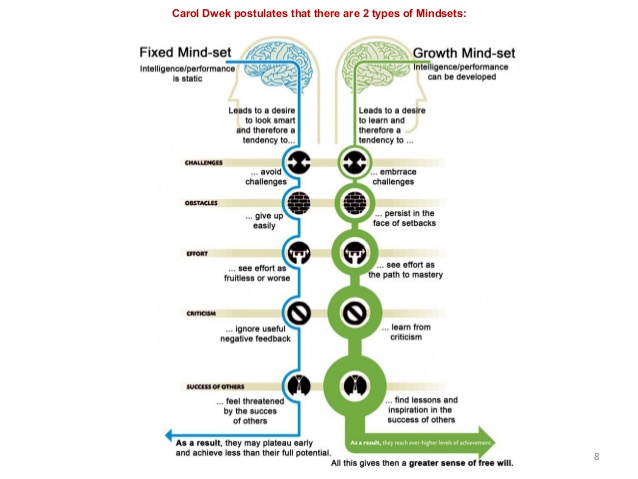The power of ‘Not yet…!’

Someone once said to me that their idea of hell, was God showing them all that their life could have been, if only they had approached life head on instead of avoiding challenges and difficulties.
“If you imagine less, less will be what you undoubtedly deserve,” Debbie Millman, an American writer, counselled in a recent Graduation speech, urging: “Do what you love, and don’t stop until you get what you love. Work as hard as you can, imagine immensities…”
Far from a Pollyanna platitude, this advice reflects what modern psychology knows about how belief systems about our own abilities and potential fuel our behaviour and actually predict our success.
Much of what we now know about belief systems comes from Carol Dweck. She has spent over 30 years studying what makes people stick at things. When things get tough or challenging, some will give up, afraid to fail, and others will keep going, excited by and relishing the challenge that this creates for them. The difference, her research concluded, is between those with a Fixed Mindset and those with a Growth mindset.
Science now tells us, we are not necessarily born with one or the other although some personality traits tend towards them. The key is that mindset can be shifted – if you want it to! One of the most basic beliefs we carry about ourselves, Dweck found in her research, has to do with how we view and inhabit what we consider to be our personality.
A “fixed mindset” assumes that our character, intelligence, and creative ability are static givens which we can’t change in any meaningful way. With a fixed mindset we believe that success is the confirmation of that inherent intelligence and that striving for success and avoiding failure at all costs become a way of maintaining the sense of being clever or skilled.
However, a “growth mindset,” thrives on challenge and sees failure not as evidence of unintelligence but as a reassuring springboard for growth and for stretching our existing abilities. Out of these two mindsets, which we manifest from a very early age, springs a great deal of our behaviour, our relationship with success and failure in both professional and personal contexts, and ultimately our capacity for happiness.
The consequences of believing that intelligence and personality can be developed rather than being engrained traits, Dweck found in her two decades of research with both children and adults, are remarkable. She said that her research has shown that the view you adopt for yourself profoundly affects the way you lead your life.
It can determine whether you become the person you want to be and whether you accomplish the things you value. How does this happen? How can a simple belief have the power to either limit or transform your life?
With a growth mindset, the hand you’re dealt is just the starting point for development. This growth mindset is based on the belief that your basic qualities are things you can cultivate through your efforts. Although people may differ in every which way: in their initial talents and aptitudes, interests, or temperaments, everyone can change and grow through application and experience. Someone once said, hard work wins, when talent doesn’t work hard!
Do people with this mindset believe that anyone can be anything, that anyone with proper motivation or education can become Einstein or Beethoven? No, but they believe that a person’s true potential is unknown and that it’s impossible to foresee what can be accomplished with years of passion, toil, and training.
At the heart of what makes the “growth mindset” so attractive, Dweck found, is that it creates a passion for learning rather than a hunger for approval. Its hallmark is the conviction that human qualities like intelligence and creativity, and even capacities like love and friendship, can be cultivated through effort and deliberate practice. Not only are people with this mindset not discouraged by failure, but they don’t actually see themselves as failing in those situations, they see themselves as learning.
Why waste time proving over and over how great you are, when you could be getting better?
Why hide deficiencies instead of overcoming them?
Why look for friends or partners who will just shore up your self-esteem instead of ones who will also challenge you to grow?
The passion for stretching yourself and sticking to it, even (or especially) when it’s not going well, is the hallmark of the growth mindset. This is the mindset that allows people to thrive during some of the most challenging times in their lives.
So, how do we effect a shift in our mindset. You simply use the statement ‘Not Yet!
When you’re struggling, whether that be a maths question, a puzzle, a life challenge, instead of getting frustrated and shouting (often inside your head), I can’t do this, I was never good at maths, I’m rubbish at this, always have been….Stop! Reframe what’s inside your head with the phrase ‘Not Yet’; I can do this just not yet. Maybe ask yourself, how do I get better at it?
Which do you want? What life do you want? (‘I’ll never get there, or I’m not there yet….’)
So, don’t be that person who looks back on their life and wishes it had been different.
How about using the phrase ‘Not yet…’ a little more often and seeing whether your growth mindset starts to shift your thinking and your life.
.jpg) Sally is the Founder of LifeBuddy. She is an Organisational Development consultant and is a Practitioner with the Association for Business Psychology.
Sally is the Founder of LifeBuddy. She is an Organisational Development consultant and is a Practitioner with the Association for Business Psychology.